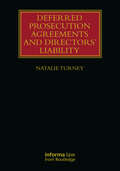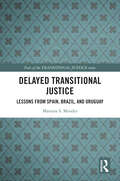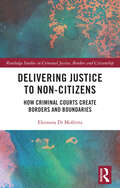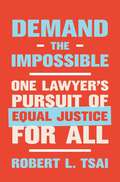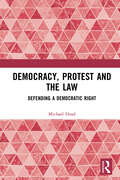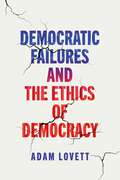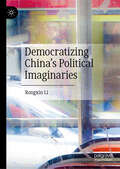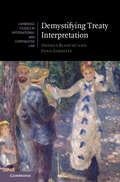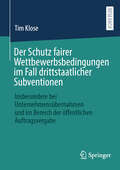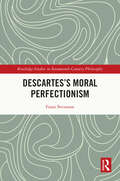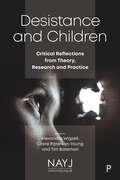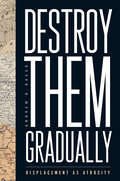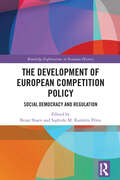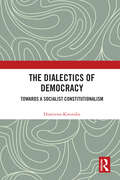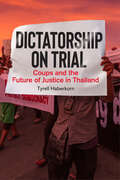- Table View
- List View
Deferred Prosecution Agreements and Directors’ Liability (ISSN)
by Natalie TurneyThis book provides in-depth analysis of deferred prosecution agreements (DPAs), a tool first introduced in the United States and since implemented in the United Kingdom and other jurisdictions. The central focus of the book is the impact of DPAs on company directors: DPAs were first introduced in the US for individuals, but are now used predominantly for corporate defendants. In the UK, DPAs have only ever been available for companies.The consideration of individuals in the introductory stage in the UK is explored in depth, as well as the consideration and targeting of individuals in cases that have followed. Company directors are exposed to liability because of this negotiated deal between the company and prosecutors, and this book addresses the key areas of exposure, and how various parties should address these risk areas in accordance with the law. The book is an increasingly necessary contribution to the topical discussion of the fallout of unsuccessful prosecutions of individuals implicated in the wrongdoing constituting the basis of DPAs, calling into question not only treatment of those individuals but also the integrity of the DPA tool itself. It also considers the impact of DPAs and arising exposures on directors’ and officers’ (D&O) liability insurance, therefore covering potential risk areas and the ability of directors to access a defence in protecting themselves from liability. The book covers the impact on all areas of a D&O policy, considering D&O policy wording and insurance law in doing so, providing a rounded account of issues arising in relation to company directors and how interested parties can act in the best interests of all whilst in accordance with law and policy.The primary audience for this book will be lawyers and practitioners in the corporate crime and/or insurance law space, including general counsels, solicitors, barristers, consultants, prosecuting authorities, legal academics, and so forth. It will also be of interest to company directors, and to students of financial crime, corporate criminal crime and insurance law, and will have great international appeal. Organisations likely to use the book will include prosecuting authorities, law firms working on corporate criminal liability or D&O insurance cases, and companies looking to protect themselves where there is alleged wrongdoing.
Delayed Transitional Justice: Lessons from Spain, Brazil, and Uruguay
by Mariana S. MendesThis book addresses the issue of the timing of transitional justice policies in countries that had negotiated transitions from authoritarianism to democracy. Why are transitional justice measures often being implemented decades after the events they refer to? More specifically, what combination of factors leads to the implementation of transitional justice policies at certain moments in time? And, what explains countries’ different choices and trajectories? To address these questions, this book pursues a comparative analysis of three cases: comparing a case of ‘robust’ implementation of transitional justice measures (Uruguay), a case where only victim-centered measures were approved (Spain), and a case that sits in between these two (Brazil). Through an in-depth empirical analysis of these specific country-cases, and focusing on seven different transitional justice initiatives, the book identifies the determinants behind delayed transitional justice policies and explains why such policies are more robust in some settings than in others. In doing so, it provides a holistic account of post-transitional justice outcomes, offering more general conclusions and insights about the study of the drivers of transitional justice. This book will appeal to scholars and students of transitional justice in politics, law, and sociology, as well as to policymakers involved in the implementation and administration of transitional justice measures.
Delivering Justice to Non-Citizens: How Criminal Courts Create Borders and Boundaries (Routledge Studies in Criminal Justice, Borders and Citizenship)
by Eleonora Di MolfettaHow does justice for non-citizens look like? This book provides a nuanced cross-section of how criminal courts deliver justice to non-citizens, investigating rationales and purposes of penal power directed at foreign defendants. It examines how lack of citizenship alters the contours of justice, creating a different system oriented at control and exclusion of non-members. Drawing on ethnographic research in an Italian criminal court, the book details how citizenship and national belonging not only matter, but are matters reproduced, elaborated, and negotiated throughout the judicial process, exploring the implications of this development for the understanding of penal power and the role of criminal courts.Set in the context of the growing intersection between migration control and penal power, Delivering Justice to Non-Citizens explores whether and how instances of border control have seeped into judicial practices. In doing so, it fills a significant gap in the scholarship on border criminology by considering a rather unexplored actor in the field of migration studies: criminal courts. Based on a year of courtroom ethnography in Turin, Delivering Justice to Non-Citizens relies on interviews with courtroom actors, courthouse observations, analysis of court files, together with local media analysis, to provide a vivid image of judicial practices towards foreign defendants in a medium-size criminal court. It considers and balances the distinctive traits of the local context with ongoing global processes and transformations and adds much needed insights into how global processes impact local realities and how the local, in turn, adjusts to global challenges. Through instances of everyday justice, the book calls attention to how migration control has silently seeped into the judicial realm.The book will be of interest to students and academics in sociology, criminology, law, penology, and migration studies. It will also be an important reading for legal practitioners, magistrates, and other law enforcement authorities.
Demand the Impossible: One Lawyer's Pursuit Of Equal Justice For All
by Robert L. TsaiHow four Supreme Court cases in recent years—all argued and won by one indomitable lawyer—are central to the pursuit of equal justice in America. Stephen Bright emerged on the scene as a cause lawyer in the early decades of mass incarceration, when inflammatory politics and harsh changes to criminal justice policy were crashing down on the most vulnerable members of society. He dedicated his career to unleashing social change by representing clients that society had long ago discarded, and advocated for all to receive a fair trial. In Demand the Impossible, Robert L. Tsai traces Bright’s remarkable career to explore the legal ideas that were central to his relentless pursuit of equal justice. For nearly forty years, Bright led the Southern Center for Human Rights, a nonprofit that provided legal aid to incarcerated people and worked to improve conditions within the justice system. He argued four capital cases before the US Supreme Court—and won each one, despite facing an increasingly hostile bench. With each victory, he brought to light how the law itself had become corrupted by the country’s thirst for severe punishment, exposing prosecutorial misconduct, continuing racial inequality, inadequate safeguards for people with intellectual disabilities, and the shameful quality of legal representation for the poor. Organized around these four major Supreme Court cases, each narrated in vivid and dramatic detail, Tsai’s essential account explores the racism built into the criminal justice system and the incredible advancements one lawyer and his committed allies made for equal rights. An electrifying work of legal history, Demand the Impossible reveals how change can be won in even the most challenging times and how seemingly small victories can go on to have outsized effects.
Democracy, Protest and the Law: Defending a Democratic Right
by Michael HeadIn a new era of rising protests, social unrest and political discontent globally, especially over climate change, war dangers, austerity measures and social inequality, the right to protest is a critical democratic right. Yet it is increasingly controversial and subject to government reaction. This book poses a crucial question: how to defend and extend democracy? It examines the critical historical, social, political, ethical and legal issues raised by the basic democratic right to protest and the legislative and executive measures being taken by governments to restrict it. These measures are examined with a focus on three countries with an English legal heritage: the United States, Britain and Australia. These states are frequently held up as models of liberal democracies, respecting core legal and democratic rights. However, an examination shows that they have adopted far-reaching anti-protest laws and other provisions that threaten protest rights and genuine democracy itself. This book will be of interest to all members of society, as well as students, academics and policy-makers in the fields of civil liberties and human rights, constitutional law, criminal justice, national security and environmental studies.
Democratic Failures and the Ethics of Democracy (Democracy, Citizenship, and Constitutionalism)
by Adam LovettIn Democratic Failures and the Ethics of Democracy, political philosopher Adam Lovett argues that when it comes to democratic ideals, the United States is a failed democracy. Specifically, he contends that American democracy has failed to advance equality and self-rule for its citizens—qualities he identifies as essential components of democracy’s intrinsic value. Drawing on rich empirical research, Lovett applies original philosophical analysis to reveal real-world democratic failures and evaluate their philosophical and ethical consequences.His research locates democratic failures at both the level of political elites and at the level of the masses. At the elite level, elected officials shape policy to prioritize the interests of their supporters, where wealthy individuals and corporations are the most influential. At the mass level, ordinary citizens are motivated to vote not to introduce specific policies but by party identification. By mapping how these failures erode equality and self-rule, he demonstrates that they in fact undermine the ethics of democracy itself. After all, Lovett argues, when a state fails to represent ordinary citizens, those ordinary citizens are not morally obligated to follow the laws of the state.Because the state fails to achieve democratic values in any meaningful way, its claim to political authority and legitimacy is diminished. However, Lovett does not conclude that American democracy is doomed—he instead proposes solutions from voting only on referendums to delegating aspects of public policy to unelected experts without partisan obligation. These reforms are vital for compelling the state to act on behalf of all citizens, not just the partisan or the powerful. Of interest to political scientists and political philosophers alike, Democratic Failures and the Ethics of Democracy sheds light on an increasingly troubled democratic ethos and proposes solutions for how ordinary citizens can work to save it.
Democratizing China’s Political Imaginaries
by Rongxin LiThis book offers a meticulous empirical examination of Chinese democracy and its myriad discourses. Delving into the intricate workings of Chinese democracy, the author explores how the Chinese Communist Party employs democratic principles, how intellectuals grapple with the concept, and how the populace perceives and engages with democracy. In transcending mere methodological nationalism, this narrative extends to the global stage, offering insights into democratic evolution beyond Western paradigms by exploring resonates particularly with developing and post-colonial countries, offering a fresh perspective on the delicate balance between state capacity, social order, and the democratization process. While the trajectory of democracy in China remains uncertain, these empirically grounded analyses provide a pragmatic lens through which to contemplate the future of Chinese political dynamics.
Demokratie und Globalisierung: Rechtliche und politische Analysen zu Beginn der vierten industriellen Revolution
by Charlotte Sieber-Gasser Alberto GhibelliniDieses Buch bietet eine eingehende rechtliche und politische Analyse der Vereinbarkeit des westfälischen Staatsmodells mit der Globalisierung und der digitalen Revolution. Es untersucht das Konzept der Demokratie in einer globalisierten Welt, erörtert die Legitimität der wirtschaftlichen Integration in den globalen Markt und präsentiert drei Fallstudien (aus Brasilien, Taiwan und Spanien) über die Auswirkungen sozialer Medien auf Wahlen. Darüber hinaus werden neue Perspektiven zu den Auswirkungen der Digitalisierung auf nationale Grenzen und auf die Rolle von Bürgerinnen und Bürgern und Expertinnen und Experten bei der Gestaltung der Globalisierung aufgezeigt. Ein abschließendes Kapitel befasst sich mit der Frage, inwieweit die aus den Analysen der oben genannten Aspekte gewonnenen Erkenntnisse bei den Bemühungen um eine Überwindung der aktuellen globalen Gesundheits- und Wirtschaftskrise berücksichtigt werden müssen.
Demystifying Treaty Interpretation (Cambridge Studies in International and Comparative Law #Series Number 188)
by null Andrea Bianchi null Fuad ZarbiyevDemystifying Treaty Interpretation doesn't just tell you how treaties are commonly interpreted. It helps you understand also the process of treaty interpretation and its outcomes. The idea that rules of treaty interpretation can guide us to the meaning of treaty provisions, in a simple and straightforward manner, is a myth to be dispelled. This book aims to capture some of the complex and nuanced processes involved in treaty interpretation. It spurs further reflection about how interpretation takes place against the background of concepts, categories, and insights from other disciplines. A useful tool for scholars, practitioners and researchers engaging with treaty interpretation at all levels, the book aims to enhance the reader's knowledge and mastery of the interpretive process in all its elements, with a view to making them more skilled and effective players in the game of interpretation.
Denken ohne fachliches Geländer?: Ethik-Unterricht zwischen den Disziplinen (Ethik und Bildung)
by Anne Burkard Laura MartenaDie meisten Ethik-Fächer in Deutschland sind als Alternativ- oder Ersatzfächer für den Religionsunterricht konzipiert. Eine Herausforderung betrifft die Verortung eines Teils dieser Fächer zwischen Philosophie, Religionswissenschaft und weiteren Disziplinen. Am Beispiel des Faches Werte und Normen diskutiert dieser Band Fragen, die sich für alle multidisziplinären Ethik-Fächer stellen: Was bedeutet es für die Konzeption, die Unterrichtspraxis und die Lehrkräftebildung eines Faches, wenn es an mehreren Bezugsdisziplinen ausgerichtet ist? Wie sollten die Bezüge verbunden oder abgegrenzt werden? Welche Konzepte für die Fachentwicklung gibt es?
Der Beteiligungsvertrag: Ein Überblick für Start-ups und Investoren (essentials)
by Christopher HahnDieses essential vermittelt auch in der aktualisierten und überarbeiteten 3. Auflage Gründern innovativer Unternehmen sowie Investoren ein Verständnis für die typischen Regelungen des Beteiligungsvertrages zwischen der Gesellschaft und dem Kapitalgeber. Christopher Hahn erläutert die Funktionsweise des Beteiligungsvertrages und der Gesellschaftervereinbarung sowie der dazugehörigen Nebenvereinbarungen. Auf leicht verständliche Weise wird erläutert, wie innovative Unternehmen die Herausforderungen der ersten Finanzierungsrunden mit Risikokapital (Venture Capital) rechtlich erfolgreich meistern können.
Der patentrechtliche Schutz von Daten und seine Grenzen: Gleichzeitig ein Beitrag zum Erfordernis der Technizität informationsbezogener Erfindungen sowie der Körperlichkeit von Erzeugnissen im Sinne des § 9 S. 2 Nr. 1 PatG
by Dr. jur. LandscheidtDaten verfügen als digitale Güter über enormes Innovationspotential. Die Möglichkeit der Patentierung von Daten ist jedoch bisher weitgehend unerforscht. Ausgehend von einem patentrechtlich definierten Datenbegriff entwickelt Dr. jur. Fabian Landscheidt in diesem Open-Access-Buch daher praxistaugliche, verfassungskonforme und mit der aktuellen Entscheidungspraxis der deutschen und europäischen Spruchkörper in Einklang stehende Fallgruppen zur Datenpatentierbarkeit. Gleichzeitig durchleuchtet er dabei kritisch die Konzepte der Technizität von Erfindungen sowie der Körperlichkeit von Verfahrens- und Sacherzeugnissen im Grenzbereich zwischen Mensch- und Maschinen-Kommunikation.Dies ist ein Open-Access-Buch.
Der Schutz fairer Wettbewerbsbedingungen im Fall drittstaatlicher Subventionen: Insbesondere bei Unternehmensübernahmen und im Bereich der öffentlichen Auftragsvergabe
by Tim KloseDen EU-Binnenmarkt zu schützen ist fundamentale Grundvoraussetzung für die Existenz und den Fortbestand der Europäischen Union. Im Lichte dessen wurde am 14. Dezember 2022 die VO 2560/2022 zur Regulierung verzerrender drittstaatlicher Subventionen auf dem EU-Binnenmarkt erlassen. Sie trat im Januar 2023 in Kraft. Das neue Regelungsregime ist dabei ein Novum; überwindet es bisherige klassische dogmatische Grenzen auf EU-Ebene, verbindet klassisch kartellrechtliche Elemente, Elemente des EU-Beihilferechts, des EU-Vergaberechts und des EU-Außenwirtschaftsrechts mit dem Ziel, den EU-Binnenmarkt robuster gegenüber Verzerrungen durch drittstaatliche Subventionen zu machen. Die vorliegende Untersuchung macht es sich zur Aufgabe, die neue Verordnung umfassend auf ihre Rechtmäßigkeit im Sinne der aufzuzeigenden Problemstellung hin zu untersuchen. Dabei liegt den Ausführungen insgesamt die These und deren Überprüfung zugrunde, dass die Verordnung zukünftig keine, wie teilweise gefordert, faktisch völlige Gleichbehandlung zwischen mitgliedstaatlichen Beihilfen und drittstaatlichen Subventionen sichert, die Verordnung gleichwohl aber zum Schutz fairer Wettbewerbsbedingungen auf dem EU-Binnenmarkt beitragen wird.
Derrida and Inheritance in Environmental Ethics: The Half-Lives of Responsibility
by Michael PetersonThis book argues for the necessity of a re-evaluation of our thinking about responsibly relating to future generations in the context of environmental philosophy. Using long-term nuclear waste disposal as its paradigmatic case, this book makes the case that the predominant mode of thinking the future in terms of continuity and repetition of the present requires a critique informed by French philosopher Jacques Derrida in order to think responsibility adequately. The book begins by surveying contemporary accounts of intergenerational responsibility before outlining the specifics of nuclear waste disposal policy. With these stakes established, the contributions of Jacques Derrida to future-oriented ethics are introduced. These include discussions of communication across contexts, the relationship between inheritance and responsibility, and the political imperatives that result from this critique. This book concludes by arguing for an intergenerational environmental policy that rejects policy and infrastructural projects that depend on the present reproducing itself indefinitely.
Descartes’s Moral Perfectionism (Routledge Studies in Seventeenth-Century Philosophy)
by Frans SvenssonThis book offers a novel and comprehensive interpretation of Descartes’s moral philosophy. In contrast to other influential interpretations, the book argues that the central tenet of his ethical thought is that each person ought to live in the way that is most conducive to their degree of overall perfection.While Descartes’s ethical thought has attracted only a very modest amount of attention among scholars, this book demonstrates that it constitutes an important and integral component of his philosophical project as a whole. It argues that Descartes’s ethics constitutes a form of moral perfectionism. In the Cartesian picture, we satisfy this requirement of perfection by using our free will well in all our conduct, something which is also necessary for obtaining happiness for ourselves. To be guaranteed happiness, however, we need to acquire the virtue of generosity, which, besides a habit of using one’s free will well, entails a habit of being attentive in one’s thought to various truths about oneself and about the world we live in. Descartes offers an interesting attempt to make living well depend entirely on ourselves and not on fate or fortune. He also leaves room for the presence of passions within such a life and for acknowledging that even fully virtuous persons’ lives may differ in their degrees of overall perfection.Descartes’s Moral Perfectionism will appeal to scholars and graduate students working on Descartes, the history of early modern philosophy, and the history of ethics.
Design and Build Contracts
by Guy HigginbottomDESIGN AND BUILD CONTRACTS Design and build (D&B) construction procurement relies on a project’s main contractor shouldering the responsibility for creating the design and executing the construction for a project. While the extent of contractor-produced design can vary, this method of construction procurement affords the contractor a greater level of input and responsibility than traditionally procured contracts (where the employer has greater design responsibility). Over the last decade in the UK, it has become clear that D&B contracts are becoming the most popular method for procuring construction projects; often echoing the ways in which contracts for infrastructure and process plant can be procured. Whilst D&B can provide a greater degree of contractor input for producing feasibility and concept designs, then the detailed design to deliver a project, many clients amend standard forms of D&B contracts to alter the contractors’ design input. This can significantly change D&B, deviating from the procedures set out in the standard forms of D&B contract. This book firstly takes the reader through each stage of a project (based upon the RIBA Plan of Work 2020) to provide guidance on how D&B contracts were intended to operate, then secondly, identifying how D&B contracts and their procedures have changed. Readers will find: Outline commentary and guidance on commonly used standard forms of D&B contract, including: JCT Design and Build 2016; FIDIC Conditions of Contract for Plant Design-Build 2017; and NEC4 How each D&B contract is intended to operate during each stage of the RIBA Plan of Work 2020 How the operation of D&B contracts and their procedures are often amended. An ideal resource for contractors, employers, and consultants, as well as those studying construction at university, Design and Build Contracts offers helpful commentary and guidance for how each stage of a D&B engineering or construction project should progress.
Desistance and Children: Critical Reflections from Theory, Research and Practice
by Colin Falconer John Wainwright Julie Shaw Martin Stephenson Claire Fitzpatrick Neal Hazel Stephen Case Samantha Burns Jo Staines Kathy Hampson Gilly Sharpe Steve Carr Kirstine Szifris Diana Johns Kevin R Haines Ross Little Katie Hunter Tim Rosier Sean Creaney Andrew Brierley Anne-Marie Douglas Roberta Evans Neema Trivedi-BatemanAvailable open access digitally under CC BY-NC-ND licence. ‘Desistance’ - understanding how people move away from offending – has become a significant policy focus in recent years, with desistance thinking transplanted from the adult to the youth justice system in England and Wales. This book is the first to critique this approach to justice-involved children, many of whom are yet to fully develop an identity (criminal or otherwise) from which to ‘desist’. Featuring voices from academia, policy and practice, this book explores practical approaches to desistance with children in the ‘Child First’ context. It gives new insights into how children can be supported to move away from offending and proposes reforms to make a meaningful difference to children’s lives.
Destroy Them Gradually: Displacement as Atrocity (Genocide, Political Violence, Human Rights)
by Andrew R. BassoPerpetrators of mass atrocities have used displacement to transport victims to killing sites or extermination camps to transfer victims to sites of forced labor and attrition, to ethnically homogenize regions by moving victims out of their homes and lands, and to destroy populations by depriving them of vital daily needs. Displacement has been treated as a corollary practice to crimes committed, not a central aspect of their perpetration. Destroying Them Gradually examines four cases that illuminate why perpetrators have destroyed populations using displacement policies: Germany’s genocide of the Herero (1904–1908); Ottoman genocides of Christian minorities (1914–1925); expulsions of Germans from East/Central Europe (1943–1952); and climate violence (twenty-first century). Because displacement has been typically framed as a secondary aspect of mass atrocities, existing scholarship overlooks how perpetrators use it as a means of executing destruction rather than a vehicle for moving people to a specific location to commit atrocities.
The Development of European Competition Policy: Social Democracy and Regulation (Routledge Explorations in Economic History)
by Sigfrido M. Ramírez Pérez Brian ShaevThis book considers a central issue of our time: the relationship between the macroeconomic objectives of political parties in democratic countries and the legal framework of market economies. The impressive panel of contributors examines social-democratic policies on cartels, market concentration and competition in different European countries, spanning a hundred-year period (specifically the interwar period, the initial postwar period, the 1960s and 1970s, the 1980s and 1990s, and the 2000s).This thought-provoking volume challenges the dominant belief that the EU’s economic system and competition policy were mainly influenced by neoliberal economic thinking, instead showing that Keynesian and social-democratic positions played a major role in the emergence of this system.It will be valuable reading for advanced students, researchers and policymakers interested in modern economic history, industrial organization, political economy, European legal history and political science.
Developments in Intellectual Property Strategy: The Impact of Artificial Intelligence, Robotics and New Technologies
by Nadia NaimResearch in the area of intellectual property (IP) is increasingly relevant to the rapidly growing artificial intelligence (AI) and robotics industries, affecting the legal, business, manufacturing, and healthcare sectors. This contributed volume aims to develop our understanding of the legal and ethical challenges posed by artificial intelligence and robotics technologies and the appropriate intellectual property based legal and regulatory responses. It provides a philosophical and legal framework for considering concepts and principles that relate to the development and use of such technologies at the international, regional, and national levels. The legal discourse in IP concerns the ever-growing AI sector and how businesses can protect their IP and incorporate AI. Moral sentiments often take a back seat to market sentiments, even in shaping the direction of ethical business strategy. This anomaly persists despite growing interest in ethics and IP. Taking an interdisciplinary and diverse perspective, this book enriches the evolving definition and scope of IP literature by focusing on actors, products and regulation that shape the business sector. Considering the gap between theory and practice, this book bridges academic and professional knowledge in unpacking legal, ethical and governance issues in the intellectual property industry. In an effort to include as many viewpoints as possible, contributions have been gathered from diverse fields, including business, ethics, governance, law, philosophy and technology studies. This book will appeal to academics in the field of intellectual property, business ethics, AI, emerging technologies and strategic innovation, as well as practitioners and policy makers.
The Dialectics of Democracy: Towards a Socialist Constitutionalism
by Dimitrios KivotidisThis book examines how the democratic form and the struggle for democracy reflects, influences and shapes the struggle for social emancipation.In the context of increased exploitation, rising inequality, and intensified struggle for social justice in the aftermath of the economic crisis, the channelling of populism through liberal democratic institutions has had contradictory effects: giving rise to both Corbyn and Brexit, Sanders and Trump, Syriza and the Golden Dawn, to name but a few. How can we make sense of these developments? In response, this book approaches the idea of democracy from a socialist constitutionalist standpoint and explores institutional forms and principles that challenge and aim at the transformation of the extant social order. This process involves the challenging of well-established ideas of the liberal viewpoint, as well as an unwavering focus on the issue of class rule which enables the highlighting of limitations of -not only mainstream but also heterodox- contemporary approaches to constitutionalism and democracy. Ultimately, democracy is conceived as a process of struggle for creating the conditions, material as well as intellectual, for its actualisation.This significant work of legal and political theory will be of considerable interest to those working in these areas to make sense of contemporary developments, and to further the causes of social justice and social emancipation.
Dictatorship on Trial: Coups and the Future of Justice in Thailand
by Tyrell HaberkornIn 2014, after a decade of political turmoil, the National Council for Peace and Order (NCPO) carried out Thailand's 13th coup since the country's transformation from absolute to constitutional monarchy in 1932. Though the NCPO promised to restore the rule of law, justice—long tenuous in Thailand—disappeared entirely. The legal system was used to criminalize the thoughts and actions of democratic dissidents, facilitate extrajudicial violence, and guarantee impunity for the coup and crimes by state officials. Combining legal and historical scholarship and long-term courtroom observation, Dictatorship on Trial traces the legal, social, and political impacts of authoritarianism, and foregrounds court decisions as both a history of repression and a site in which to imagine future justice. Organized chronologically across the five years of the NCPO regime, each chapter takes up a different political case and enumerates the ways in which political activists were made vulnerable rather than protected by the state's interpretations of the law, and the mechanisms through which perpetrators evaded accountability. Inspired by feminist legal scholars, the substantive analysis in each chapter is followed by new, rewritten judgments created in collaboration with Thai human rights activists. In plotting these alternative logics, interpretations of evidence, and conclusions, Tyrell Haberkorn outlines what true justice might look like, and assesses the legal and political transformations necessary to realize it.
Die Auswirkungen der hohen Inflationsraten auf die Unternehmensbewertungen (essentials)
by Stefan Georg Tatjana Derr Chris HeilerDas essential untersucht den Einfluss hoher Inflationsraten auf die Unternehmensbewertung mittels Discounted-Cashflow-Methoden. Dabei analysiert es umfassend die Auswirkungen auf Einnahmen und Gesamtwert, hebt konkret betroffene DCF-Parameter hervor und validiert theoretische Prognosen anhand einer DAX-40-Unternehmensanalyse.
Die Interessenkonflikte der betrieblichen und behördlichen Datenschutzbeauftragten: Eine Analyse der Konfliktlagen und Verbundenheiten
by Patrick GrosmannIn dem vorliegenden Buch werden die Interessenkonflikte der betrieblichen und behördlichen Datenschutzbeauftragten analysiert. Im Mittelpunkt steht eine ausführliche praxisbezogene Analyse der möglichen Interessenkonflikte der Datenschutzbeauftragten. Es wird herausgearbeitet, wie sich diese Interessenkonflikte auf die Praxis der betrieblichen und behördlichen Datenschutzbeauftragten auswirken und welche Unterschiede sich bei einer internen oder externen Benennung des Datenschutzbeauftragten ergeben.Art. 38 Abs. 6 S. 1 DSGVO sieht ein Verbot der Zuweisung konfligierender Aufgaben vor – die Möglichkeiten eines Interessenkonflikts des Datenschutzbeauftragten gehen jedoch weit über diese normierte Konfliktmöglichkeit hinaus. Konkret werden in der Arbeit Interessenkonflikte in Bezug auf die unabhängige Stellung, die Aufgaben, die Pflichten und die Rechtsbeziehungen des Datenschutzbeauftragten betrachtet. Bei der Analyse der Interessenkonflikte wird berücksichtigt, dass der Datenschutzbeauftragte zugleich dem Verantwortlichen, den Betroffenen, den Aufsichtsbehörden und dem Datenschutz als abstraktes Schutzgut verpflichtet ist. Schließlich wird in der Arbeit aufgezeigt, welchen Verbundenheiten sich der Datenschutzbeauftragte ausgesetzt sieht und welche Antworten des Rechts den Interessenkonflikten gegenüberstehen.
Die Mindestbesteuerung multinationaler Konzerne: Zur Vereinbarkeit der GloBE-Regeln mit höherrangigem Recht und Doppelbesteuerungsabkommen aus deutscher Perspektive (PwC-Studien zum Unternehmens- und Internationalen Steuerrecht #13)
by Nicolas SteinmeisterDieses Open-Access-Buch behandelt die globale Mindeststeuer für Großkonzerne, auf die sich im Herbst 2021 137 Staaten verständigt haben, die als Mitglieder im Inclusive Framework (IF) on BEPS von G20/OECD an der Reform des internationalen Steuerrechts arbeiten. Das Buch untersucht, ob die Bundesrepublik Deutschland als an der Einigung beteiligtes Mitglied des IF die neuen Regeln, wie sie aus der Einigung vom 8. Oktober 2021 und den Modellregeln vom 20. Dezember 2021 hervorgegangen sind, implementieren kann. Abgestellt wird hierbei auf eine zum Zeitpunkt der Einreichung dieser Arbeit noch diskutierte rein nationale Umsetzung ohne unionsrechtliche Harmonisierungsvorgaben. Vor diesem Hintergrund werden die Regelungen auf ihre Vereinbarkeit mit den Vorgaben des Grundgesetzes, des EU-Rechts und der nach völkerrechtlichen Rechtssätzen verbindlichen Doppelbesteuerungsabkommen überprüft. Unter Berücksichtigung der bislang zu diesen Fragen erschienen Literaturstimmen setzt sich der Autor mit den konkreten Empfehlungen der Modellregeln auseinander und bringt seine eigenen Überlegungen unter besonderer Berücksichtigung der deutschen Perspektive ein.
